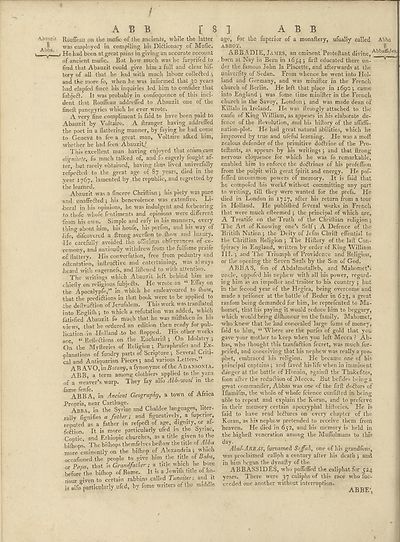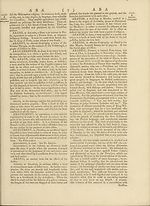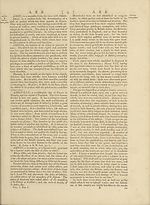Encyclopaedia Britannica, or, a Dictionary of arts, sciences, and miscellaneous literature : enlarged and improved. Illustrated with nearly six hundred engravings > Volume 1, A-AME
(26) Page 8
Download files
Complete book:
Individual page:
Thumbnail gallery: Grid view | List view

ABB [8
Ajbauzit Rouffeau on the mafic of the ancients, while the latter
was employed in compiling his Dictionary of Mafic.
‘' . He had been at great pains in giving an accurate account
of ancient mafic. Bat how much was he furprifed to
find that Abauzit could give him a full and clear hif-
tory of all that he had with much labour collected j
and the more fo, when he was informed that 30 years
had elapfed fince his inquiries led him to confider that
fubjeCt. It was probably in confequence of this inci¬
dent that Rouffeau addreffed to Abauzit one of the
fineft panegyrics which he ever wrote.
A very fine compliment is faid to have been paid to
Abauzit by Voltaire. A ftranger having addreiTed
the poet in a flattering manner, by faying he had come
to Geneva to fee a great man, Voltaire aiked him,
whether he had feen Abauzit.?
This excellent man having enjoyed that otiumcum
•dignitote, fo much talked of, and fo eagerly fought af¬
ter, but rarely obtained, having thus lived univerfally
refpe&ed to the great age of S7 years, died in the
year 1767, lamented by the republic,.and regretted by
the learned.
Abauzit was a fincere Chrifiian 5 his piety was pure
and unafFe&ed ; his benevolence was extenfive. Li¬
beral in Ins opinions, he was indulgent and forbearing
to thofe whofe fentiments and opinions were different
from his own. Simple and eafy in his manners, every
thing about him, his houfe, his perfon, and his way of
fife, difcovered a ftrong averfion to fliow and luxury*
-He carefully avoided the officious obfervances of ce-
•remony, and anxioufly withdrew from the fuifome piaife
of flattery. His converfation, free from pedantry and
oftentation, inftructive and entertaining, was always
heard with eagernefs, and liftened to with attention.
The writings which Abauzit left behind him are
chiefly on religious fubjeCls. He wrote an “ Efifay on
the A pocalypfe,” in which he endeavoured to (how,
that the predictions in that book were to be applied to
the deftruCHon of Jerufaiem. This work was tranflated
into Englifn ; to which a refutation was added, which
fatisfied Abauzit f« much that he was miftaken in his
views, that he ordered an edition then ready for pub¬
lication in -Holland-to be flopped. His other works
are, “ Reflections on the Eucharift ; On Idolatry 7
On the Mvfteries of Religion; Paraphrafes and Ex¬
planations of fundry parts of Scripture ; Several Criti¬
cal and Antiquarian Pieces; and various Letters.”
AB AVO,inBo/rt7;y, a fynonyme of the Adansonia.
ABB, a term among clothiers applied to the yarn
of a weaver’s warp. They fay alfo Abb-wool in the
fame fenfe. r a r ■
ABBA, in Ancient Geography, a town ot Africa
Propria, near Carthage.
Abba, in the Syriac and Chaldee languages, liter-
rally fioriifies a father; and figuratively, a fupenor,
reputed” as a father in refped of age, dignity, or af-
feCtion It is more particularly ufed in the Syriac,
Coptic’ and Ethiopic churches, as a title given to the
bifliops. The bifliops themfelves beftow the title of Abba
more eminently on the bifliop of Alexandria ; which
occafioned the people to give hun the title of Baba,
or Papa, that is Grandfather; a title which he bore
before the bifliop of Rome. It is a Jewifti title of ho¬
nour given to certain rabbins called Tanattes: and it
is alfo particularly ufed, by feme writers of the middle
] ABB
age, for the fuperior of a monafiery, ufually called Abha
abbot. 11
ABBADIE, James, an eminent Proteftant divine,
born at Nay in Bern in 1654; firfl: educated there un- v "
der the famous John la Placette, and afterwards at the
univerfity of Sedan. From whence he went into Hol¬
land and Germany, and was minifter in the French
church of Berlin. He left that place in 1690; came
into England ; was fome time minifter in the French
church in the Savoy, London ; and rvas made dean of
Killalo in Ireland. He was ftrongly attached to the
caufe of King William, as appears in his elaborate de¬
fence of the Revolution, and hE hiftory of the aflafti-
nation-plot. He had great natural abilities, which he
improved by true and ufeful learning. He was a moft
zealous defender of the primitive dodlrine of the Pro-
teftants, as appears by his writings ; and that ftrong
nervous eloquence for which he was fo remarkable,
enabled him to enforce the doftrines of his profefiion
from the pulpit with great fpirit and energy. He pof-
fefled uncommon powers of memory. It is faid that
he com poled his works without committing any part
to writing, till they were wranted for the prefs. Lie
•died in London in 1727, after his return from a tour
in Holland. He publiflied feveral works in French
that were much efteemed ; the principal of which are,
A Treatife on the Truth of the Chriftian religion ;
The Art of Knowing one’s Self; A Defence of the
Britifh Nation ; the Deity of Jefus Chrift effential to
the Chrilltan Religion ; The Hiftory of the laft Con-
fpiracy in England, written by order of King William
III. ; and The Triumph of Providence and Religion,
or the opening the Seven Seals by the Son of God.
ABBAS, fon of Abdalmotalleb, and Mahomet’s
uncle, oppofed his nephew with all his power, regard¬
ing him as an impoftor and traitor to his country ; but
in the fecond year of the Hegira, being overcome and
made a prifoner at the battle of Beder in 623, a great
ranfom being demanded for him, he reprefented to Ma¬
homet, that his paying it would reduce him to beggary,
which would bring dilhonour on the family. Mahomet,
who knew that he had concealed large funis of money,
faid to him, “ Where are the purfes of gold that you
gave your mother to keep when you left Mecca ? Ab¬
bas, who thought this tranfaftion fecret, was much fur¬
prifed, and conceiving that his nephew was really a pro¬
phet, embraced his religion. He became one of his
principal captains; and faved his life when in imminent
danger at the battle of Honain, againft the Thakefites,
foon after the reduction of Mecca. But befides being a
great commander, Abbas was one of the firft doctors of
Ifiamifm, the whole of whofe fcience confifted in bein£
able to repeat and explain the Koran, and to preferve
in their memory certain apocryphal hiftories. Lie is
faid to have read le&ures on every chapter of the
Koran, as his nephew pretended to receive them from
heaven. He died in 652, and his memory is held in
the higheft veneration among the Muflulmans to tins
day.
Abul-ARBAS, fumamed Sajffah, one of his grandfons,
was proclaimed caliph a century after his death ; and
in him began the dynafty of the
ABBASSIDES, who poffefled the caliphat for 524
years. There were 37 caliphs of this race who fuc-
ceeded one another without interruption.
ABBE'.
Ajbauzit Rouffeau on the mafic of the ancients, while the latter
was employed in compiling his Dictionary of Mafic.
‘' . He had been at great pains in giving an accurate account
of ancient mafic. Bat how much was he furprifed to
find that Abauzit could give him a full and clear hif-
tory of all that he had with much labour collected j
and the more fo, when he was informed that 30 years
had elapfed fince his inquiries led him to confider that
fubjeCt. It was probably in confequence of this inci¬
dent that Rouffeau addreffed to Abauzit one of the
fineft panegyrics which he ever wrote.
A very fine compliment is faid to have been paid to
Abauzit by Voltaire. A ftranger having addreiTed
the poet in a flattering manner, by faying he had come
to Geneva to fee a great man, Voltaire aiked him,
whether he had feen Abauzit.?
This excellent man having enjoyed that otiumcum
•dignitote, fo much talked of, and fo eagerly fought af¬
ter, but rarely obtained, having thus lived univerfally
refpe&ed to the great age of S7 years, died in the
year 1767, lamented by the republic,.and regretted by
the learned.
Abauzit was a fincere Chrifiian 5 his piety was pure
and unafFe&ed ; his benevolence was extenfive. Li¬
beral in Ins opinions, he was indulgent and forbearing
to thofe whofe fentiments and opinions were different
from his own. Simple and eafy in his manners, every
thing about him, his houfe, his perfon, and his way of
fife, difcovered a ftrong averfion to fliow and luxury*
-He carefully avoided the officious obfervances of ce-
•remony, and anxioufly withdrew from the fuifome piaife
of flattery. His converfation, free from pedantry and
oftentation, inftructive and entertaining, was always
heard with eagernefs, and liftened to with attention.
The writings which Abauzit left behind him are
chiefly on religious fubjeCls. He wrote an “ Efifay on
the A pocalypfe,” in which he endeavoured to (how,
that the predictions in that book were to be applied to
the deftruCHon of Jerufaiem. This work was tranflated
into Englifn ; to which a refutation was added, which
fatisfied Abauzit f« much that he was miftaken in his
views, that he ordered an edition then ready for pub¬
lication in -Holland-to be flopped. His other works
are, “ Reflections on the Eucharift ; On Idolatry 7
On the Mvfteries of Religion; Paraphrafes and Ex¬
planations of fundry parts of Scripture ; Several Criti¬
cal and Antiquarian Pieces; and various Letters.”
AB AVO,inBo/rt7;y, a fynonyme of the Adansonia.
ABB, a term among clothiers applied to the yarn
of a weaver’s warp. They fay alfo Abb-wool in the
fame fenfe. r a r ■
ABBA, in Ancient Geography, a town ot Africa
Propria, near Carthage.
Abba, in the Syriac and Chaldee languages, liter-
rally fioriifies a father; and figuratively, a fupenor,
reputed” as a father in refped of age, dignity, or af-
feCtion It is more particularly ufed in the Syriac,
Coptic’ and Ethiopic churches, as a title given to the
bifliops. The bifliops themfelves beftow the title of Abba
more eminently on the bifliop of Alexandria ; which
occafioned the people to give hun the title of Baba,
or Papa, that is Grandfather; a title which he bore
before the bifliop of Rome. It is a Jewifti title of ho¬
nour given to certain rabbins called Tanattes: and it
is alfo particularly ufed, by feme writers of the middle
] ABB
age, for the fuperior of a monafiery, ufually called Abha
abbot. 11
ABBADIE, James, an eminent Proteftant divine,
born at Nay in Bern in 1654; firfl: educated there un- v "
der the famous John la Placette, and afterwards at the
univerfity of Sedan. From whence he went into Hol¬
land and Germany, and was minifter in the French
church of Berlin. He left that place in 1690; came
into England ; was fome time minifter in the French
church in the Savoy, London ; and rvas made dean of
Killalo in Ireland. He was ftrongly attached to the
caufe of King William, as appears in his elaborate de¬
fence of the Revolution, and hE hiftory of the aflafti-
nation-plot. He had great natural abilities, which he
improved by true and ufeful learning. He was a moft
zealous defender of the primitive dodlrine of the Pro-
teftants, as appears by his writings ; and that ftrong
nervous eloquence for which he was fo remarkable,
enabled him to enforce the doftrines of his profefiion
from the pulpit with great fpirit and energy. He pof-
fefled uncommon powers of memory. It is faid that
he com poled his works without committing any part
to writing, till they were wranted for the prefs. Lie
•died in London in 1727, after his return from a tour
in Holland. He publiflied feveral works in French
that were much efteemed ; the principal of which are,
A Treatife on the Truth of the Chriftian religion ;
The Art of Knowing one’s Self; A Defence of the
Britifh Nation ; the Deity of Jefus Chrift effential to
the Chrilltan Religion ; The Hiftory of the laft Con-
fpiracy in England, written by order of King William
III. ; and The Triumph of Providence and Religion,
or the opening the Seven Seals by the Son of God.
ABBAS, fon of Abdalmotalleb, and Mahomet’s
uncle, oppofed his nephew with all his power, regard¬
ing him as an impoftor and traitor to his country ; but
in the fecond year of the Hegira, being overcome and
made a prifoner at the battle of Beder in 623, a great
ranfom being demanded for him, he reprefented to Ma¬
homet, that his paying it would reduce him to beggary,
which would bring dilhonour on the family. Mahomet,
who knew that he had concealed large funis of money,
faid to him, “ Where are the purfes of gold that you
gave your mother to keep when you left Mecca ? Ab¬
bas, who thought this tranfaftion fecret, was much fur¬
prifed, and conceiving that his nephew was really a pro¬
phet, embraced his religion. He became one of his
principal captains; and faved his life when in imminent
danger at the battle of Honain, againft the Thakefites,
foon after the reduction of Mecca. But befides being a
great commander, Abbas was one of the firft doctors of
Ifiamifm, the whole of whofe fcience confifted in bein£
able to repeat and explain the Koran, and to preferve
in their memory certain apocryphal hiftories. Lie is
faid to have read le&ures on every chapter of the
Koran, as his nephew pretended to receive them from
heaven. He died in 652, and his memory is held in
the higheft veneration among the Muflulmans to tins
day.
Abul-ARBAS, fumamed Sajffah, one of his grandfons,
was proclaimed caliph a century after his death ; and
in him began the dynafty of the
ABBASSIDES, who poffefled the caliphat for 524
years. There were 37 caliphs of this race who fuc-
ceeded one another without interruption.
ABBE'.
Set display mode to:
![]() Universal Viewer |
Universal Viewer | ![]() Mirador |
Large image | Transcription
Mirador |
Large image | Transcription
Images and transcriptions on this page, including medium image downloads, may be used under the Creative Commons Attribution 4.0 International Licence unless otherwise stated. ![]()
| Permanent URL | https://digital.nls.uk/193132323 |
|---|
| Attribution and copyright: |
|
|---|
| Description | Ten editions of 'Encyclopaedia Britannica', issued from 1768-1903, in 231 volumes. Originally issued in 100 weekly parts (3 volumes) between 1768 and 1771 by publishers: Colin Macfarquhar and Andrew Bell (Edinburgh); editor: William Smellie: engraver: Andrew Bell. Expanded editions in the 19th century featured more volumes and contributions from leading experts in their fields. Managed and published in Edinburgh up to the 9th edition (25 volumes, from 1875-1889); the 10th edition (1902-1903) re-issued the 9th edition, with 11 supplementary volumes. |
|---|---|
| Additional NLS resources: |
|

